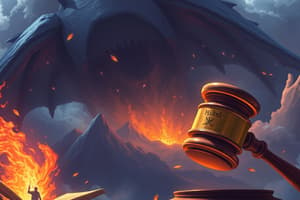Podcast
Questions and Answers
Which scenario could qualify as defamation under Exception 7?
Which scenario could qualify as defamation under Exception 7?
- A parent chastising a child for misbehaving in front of peers.
- A schoolmaster giving a bad review to a pupil in private. (correct)
- A judge criticizing a witness's reliability in a court.
- A banker expressing concerns about a cashier's forgetfulness publicly.
What characterizes the accuser's intention in Exception 8?
What characterizes the accuser's intention in Exception 8?
- To seek revenge against the accused.
- To defame the accused in public.
- To act in good faith towards lawful authority. (correct)
- To manipulate the lawful authority for personal gain.
Which of the following instances falls under Exception 9 for making a character imputation?
Which of the following instances falls under Exception 9 for making a character imputation?
- A parent publicly humiliating their child for poor grades.
- A witness giving false testimony during a trial.
- A shopkeeper warning his staff against a customer suspected of stealing. (correct)
- A teacher discussing a student's misbehavior with other parents.
What does Exception 10 state regarding caution conveyed to one person about another?
What does Exception 10 state regarding caution conveyed to one person about another?
Which of the following penalties can be imposed for defamation?
Which of the following penalties can be imposed for defamation?
Who falls under exception for lawful authority as per Exception 7?
Who falls under exception for lawful authority as per Exception 7?
What is the key requirement for an accusation to be considered valid under Exception 8?
What is the key requirement for an accusation to be considered valid under Exception 8?
According to Exception 9, which statement is true about making character imputations?
According to Exception 9, which statement is true about making character imputations?
What does not qualify as 'good faith' in the context of censure as per Exception 7?
What does not qualify as 'good faith' in the context of censure as per Exception 7?
Which of the following actions may lead to prosecution under the described defamation laws?
Which of the following actions may lead to prosecution under the described defamation laws?
What is the basis for defamation to be considered justified under Exception 1?
What is the basis for defamation to be considered justified under Exception 1?
Which Exception allows opinions to be expressed about public servants?
Which Exception allows opinions to be expressed about public servants?
Under which circumstance is it not considered defamation when discussing a private person's conduct?
Under which circumstance is it not considered defamation when discussing a private person's conduct?
Which of the following statements best describes Exception 4 regarding court proceedings?
Which of the following statements best describes Exception 4 regarding court proceedings?
What is required for an opinion expressed under Exception 5 to not be considered defamation?
What is required for an opinion expressed under Exception 5 to not be considered defamation?
In which scenario would an opinion about a performance not lead to defamation under Exception 6?
In which scenario would an opinion about a performance not lead to defamation under Exception 6?
Which statement about Exception 2 about public servants' conduct is true?
Which statement about Exception 2 about public servants' conduct is true?
What does Exception 1 imply about statements made for the public good?
What does Exception 1 imply about statements made for the public good?
If an individual claims 'I think Z's character is questionable based on a trial,' under which exception might this be protected from defamation?
If an individual claims 'I think Z's character is questionable based on a trial,' under which exception might this be protected from defamation?
What does it mean for an imputation to be considered defamation?
What does it mean for an imputation to be considered defamation?
In the context of defamation, which of the following is acceptable when making an imputation?
In the context of defamation, which of the following is acceptable when making an imputation?
Which of the following would qualify as an imputation of defamation according to the provided definitions?
Which of the following would qualify as an imputation of defamation according to the provided definitions?
What is a critical factor for determining whether an imputation harms a person's reputation?
What is a critical factor for determining whether an imputation harms a person's reputation?
Which scenario would NOT typically qualify as defamation?
Which scenario would NOT typically qualify as defamation?
Which statement about defamation involving organizations is accurate?
Which statement about defamation involving organizations is accurate?
What could be considered an exception to defamation as defined in the content?
What could be considered an exception to defamation as defined in the content?
How does defamation apply to statements about deceased individuals?
How does defamation apply to statements about deceased individuals?
What reasoning can be drawn from the scenario where A says, 'Z is an honest man; he never stole B’s watch'?
What reasoning can be drawn from the scenario where A says, 'Z is an honest man; he never stole B’s watch'?
According to the conditions of defamation, which statement would NOT be deemed harmful?
According to the conditions of defamation, which statement would NOT be deemed harmful?
Flashcards are hidden until you start studying
Study Notes
Defamation Overview
- Defamation is the act of making harmful statements about a person, whether spoken, written, or represented visually, with the intent to harm their reputation.
- It applies to both living and deceased individuals, punishing harmful imputations that impact the feelings and reputation of the deceased's relatives.
- Corporations or organizations can also be defamed through harmful statements.
Key Aspects of Defamation
- A statement must directly or indirectly lower a person’s moral or intellectual character, impact their caste/job reputation, or suggest a disgraceful state of being to be considered defamation.
- Examples of defamation include false accusations or misleading representations about an individual’s actions or characteristics.
Exceptions to Defamation
- Truthful statements made for public good are not considered defamation.
- Opinions expressed in good faith regarding public servants' conduct are exempt.
- Comments concerning public matters are permissible if based on conduct, maintaining focus on the individual's performance in those matters.
- Reporting court proceedings truthfully does not qualify as defamation.
Opinions on Court Cases
- Good faith opinions regarding a case or the conduct of individuals involved in legal proceedings are not defamatory as long as they are based on conduct relevant to the case.
Critique of Public Performances
- Evaluative remarks about performances (books, speeches, acts) presented to the public are generally exempt if they pertain directly to the work.
Authority and Censure
- Individuals with lawful authority can express opinions or censure the conduct of others under their supervision without defaming them, provided this is done in good faith.
Accusations to Authorities
- Accusations made to individuals in lawful authority about others are not considered defamatory if expressed in good faith.
Good Faith Imputations
- Statements made in good faith to protect one's interests or public interests are exempt from defamation claims.
- Cautions provided to someone about another individual must serve the good of the informed person or the public to avoid defamation.
Punishments for Defamation
- Defamation can result in punishments including up to two years of simple imprisonment, fines, or community service.
- Individuals involved in the publication or sale of defamatory materials, knowing their content, face similar consequences.
Studying That Suits You
Use AI to generate personalized quizzes and flashcards to suit your learning preferences.




